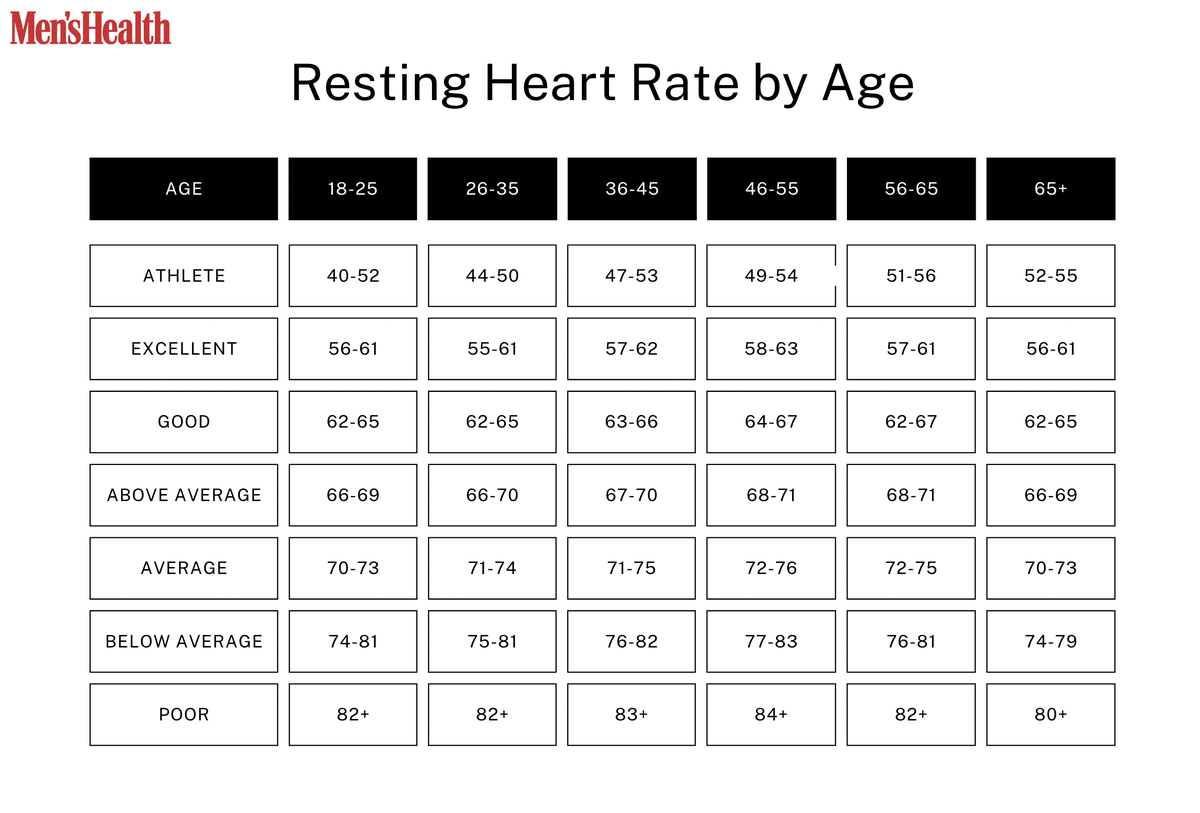When you're sitting or lying down, your heart rate tends to vary slightly, and it's bit hard to be precise about what's normal. So, just what should your resting heart rate be?
For a few minutes. It may appear to be an uncomplicated metric in the vast ocean of medical and fitness data, but your resting heart rate is one of the most accessible ways of gauging your overall well-being. Happily, it's very straightforward to measure, with or without a smartwatch.
Dr., a doctor of emergency medicine and medical director at CareHive Health in Austin, Texas.
So, what is a typical heart rate for men, and what does it tell us about our health? Here are some things you should know.
According to the American Heart Association, a normal resting heart rate for adults is typically between 60-100 beats per minute. However, some studies suggest that a normal heart rate may be lower, ranging from 40-80 bpm.
A normal resting heart rate is between 60 to 100 beats per minute.
It doesn't have to function as intensively if it's operating within that region, explains Kate Traynor, M.S., R.N., director of the Cardiovascular Disease Prevention Centre at Massachusetts General Hospital in the UK.
"Envisualise your heart as a car and the oxygen carried in your blood as petrol. The quicker you travel, the more petrol you're going to use [the more blood your heart has to pump]. Using more petrol means your heart has to do more work, which can put it under constant strain.'
Discovering Your Natural Heartbeat
to get your numbers.
"The most effective method of establishing your resting heart rate is to master the skill of taking your pulse,' advises Dr. Mittal, who suggests this can be achieved by palpating the pulse at your wrist or neck.'
Please place your index and third fingers on your neck, alongside your windpipe. Alternatively, if you prefer to check at your wrist, position two fingers between the bone and the tendon, aiming to locate your radial artery, which is situated on the thumb side of your wrist.
Once you find your pulse, count the beats in 15 seconds then multiply by four to determine your beats per minute, in line with the Mayo Clinic's guidance.
It's essential to establish a consistent heart rate benchmark for your body. If you have an idea of what's normal for you, keep track of it. If you notice any changes, especially if your heart rate is persistently lower than usual or racing without apparent cause, consider consulting a doctor.
Engines may notice you're expending more effort or get fatigued more easily during a workout, it's high time you paid a visit to the doctor,' says Traynor.
Anyone who has concerns regarding potential issues with their heart rate should seek medical attention, Dr. Singh advises. A fast heart rate typically presents as a pounding or racing heart sensation, making you feel unwell overall. Slow heart rates do not cause any symptoms inside the chest area, instead, causing people to feel weak and lightheaded. In a serious condition, a very low heart rate can lead to fainting or near-fainting episodes. Summing it up: If you notice any of these changes, go and get checked over.
What's a Typical Resting Heart Rate for an Adult by Age
To assess where your resting heart rate lies in relation to your age.

A heart rate is considered slow if it is less than 60 beats per minute (bpm) resting and below 40 bpm during sleep. On the other hand, it is considered fast if it exceeds 100 bpm at rest and over 100 bpm when asleep.
Fast Resting Heart Rates
When it is released, it triggers the adrenaline hormone that causes the "fight-or-flight" response.
'Adrenaline is like petrol to a fire for your heart rate,' says Traynor. It can also lead to more serious complications - everything from fainting spells to bigger problems like blood clots that lead to a stroke, or ultimately heart failure.
The investigation discovered that individuals with a resting heart rate of 84 beats per minute or more over a period of five years were 55% more likely to die from heart disease compared to those with slower resting heart rates.
Slow Resting Heart Rates
On the other hand, a resting heart rate below 60 beats per minute is referred to as bradycardia, which can lead to insufficient blood flow to the brain.
'A slower than usual heart rate can result in symptoms such as feeling extremely fatigued, experiences of lightheadedness, dizziness, and as a worst-case scenario, loss of consciousness,' says Suneet Mittal, M.D., F.H.R.S., of the Heart Rhythm Society.
There are certain conditions, such as thyroid disease, that can impact the speed at which your heart beats, Dr Singh notes. 'For those with an overactive thyroid, known as hyperthyroidism, the higher-than-normal amount of thyroid hormone can cause an elevated heart rate,' he explains. 'On the other hand, individuals with an underactive thyroid, also known as hypothyroidism, may have slower heart rates.'
As Dr. Singh notes, certain medications can also influence your heart rate. Stimulants such as pseudoephedrine, often discovered in decongestants, can cause it to increase. Meanwhile, beta-blockers, typically prescribed for hypertension and hyperthyroidism, can impact heart rate and give the impression that it has decreased. Additionally, electrical irregularities in the pathways of the heart can also result in a lower resting heart rate.
The heart rate can be lower than 40 beats per minute. This is because their basic metabolic needs can be met without the heart having to pump as much blood as the average person, Dr Singh explains. 'The heart becomes more efficient at pumping blood after we exercise, which is why we recommend regular cardiovascular exercise,' he says.
Not overdoing it, one of the most effective things to do to keep your resting heart rate healthy is exercising. You should be combining cardio and weights in your routine for a total of 150 minutes a week, says Traynor.

What Factors Influence Resting Heart Rate?
Fitness Level
Those with robust cardiovascular fitness instruct their heart to operate more efficiently during physical activity. As a consequence, the heart becomes more effective at circulating blood, enabling it to reduce the frequency at which it pumps.
Body Size
Actually, it's actually found that people who are taller often have a lower resting heart rate than those who are shorter in stature.
Physical/Mental State
Your heart rate increases—whilst the outside temperature warms up, so does your body temperature. As your body warms up, your heart starts to beat faster.
How emotions can have a significant effect on your resting heart rate. If you're feeling anxious or upset, your heart rate is likely to increase accordingly.
It's a good idea to familiarise yourself with your resting heart rate, as it varies from person to person and is actually a range rather than a fixed number, so you can get it checked if it starts behaving abnormally.
What is My Maximum Heart Rate?
As you engage in physical activity, your heartbeat becomes more frequent. Your highest possible heart rate is:
220 minus your age
Engaging in vigorous exercise with a heart rate above this level can be detrimental to your health. It is advisable to train at a level that matches your current fitness level and cardiovascular health.

If you're experiencing an excessively high resting heart rate that's causing symptoms like dizziness, shortness of breath, or chest pain, seek medical attention.
If you are concerned about your resting heart rate being too high, you can adjust your lifestyle to include the following interventions:
- Research indicates that engaging in frequent physical activity can lead to a decrease in resting heart rate. The research recommendation was that yoga and aerobic exercise may be particularly effective in achieving this outcome.
- it was discovered that individuals with greater body weights had higher resting heart rates compared to those with lesser body weights.
- Chronic stress affects levels of adrenaline and cortisol, hormones that can increase heart rate. By employing stress-relieving strategies, we can support a reduction in our resting heart rate.
- It has been discovered that variations from regular sleep schedules can have an adverse effect on resting heart rates.
- By including a balanced diet that combines sufficient protein, carbs and fats with adequate micronutrients, we'll be more likely to maintain a healthy weight. Likewise, by opting for whole foods, we are also likely to consume more fibre, which can help lower the risk of cardiovascular illnesses.
- Dehydration can affect our bodily functions, reduce our energy levels and increase our susceptibility to illnesses.
- Guidelines suggest drinking 6-8 cups of water daily.

